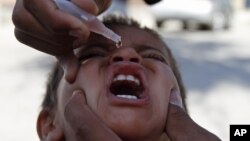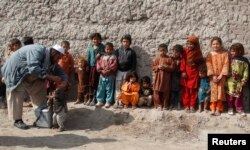Afghanistan will restart a polio vaccination drive in the coming days for thousands of children in remote eastern regions previously controlled by the Islamic State, provincial authorities say.
Polio vaccinations have been on hold for more than 18 months because health workers were not able to safely travel to three restive districts in Nangarhar province, which borders Pakistan. In all, the new drive will attempt to reach 137 districts in 14 provinces where the polio virus is active.
IS has been blocking polio vaccination campaigns, saying the Afghan government and the West are using health workers for intelligence-gathering purposes. IS also gave out misinformation about the polio efforts, saying the vaccine causes long-term fertility problems for both boys and girls, and it contains pork products, which are unlawful under Islamic law.
According to the World Health Organization, polio remains endemic in Afghanistan and neighboring Pakistan, the only places in the world where the virus continues to circulate except for Nigeria.
After intense battles, recent military operations by Afghan and U.S. forces in eastern Nangarhar province have cleared many areas of IS militants.
Thousands of children could not get polio vaccines in the Achin, Kot and Haskamena districts.
"We were unable to vaccinate 18,000 children during the previous drives," Ali Gul, Nangarhar's polio campaign manager, told VOA. "As a result of the recent military operations [against IS], we hope that the number of unvaccinated children will reach zero."
Many parents and local residents are demanding that the government quickly carry out a polio drive.
"Many areas have been cleared [of IS]," one resident told VOA. "Now there is relative peace in the area. We ask that the children's vaccination start soon."
Provincial health authorities have asked local residents who had been displaced by IS to return to their homes so that their children can be vaccinated. The polio drive could begin as early as next week.
"We ask the government to create security check-posts in areas recently cleared so the displaced people can return to their homes and get their children vaccinated," said Hamidullah, a local resident who, like many Afghans, uses only a first name.
VOA's Noor Zahid contributed to this report from Washington.





